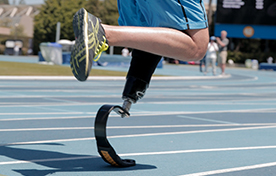Surgery For Young Children
– by Clayton Frech
I will always remember the image of my almost 3-year-old son lying helplessly in ICU after his surgery, with dozens of tubes and wires connected to him and a huge oxygen mask over his face. The feeling of anxiety while wheeling him into the operating room has stayed with me like a shadow. The fear that we made the wrong decision has only recently begun to fade, nearly a year later. Although we had almost 3 years to get ready for our son’s surgery, I felt completely surprised by and unprepared for the actual experience.
Our beautiful, wonderful son Ezra was born missing his left knee and fibula (the outer leg bone below the knee) but with a nice-looking foot. He was also born with a shortened left ulna (the inner bone of the forearm) and only one functional finger on his left hand. Our surprise at birth of his limb differences was quickly channeled toward raising a happy, confident, normal child and giving him all the tools he needed to accommodate his differences. By the time we brought our newborn son home from the hospital, we were already trying to figure out our surgical game plan. From our earliest visit by orthopedic surgeons in the maternity ward, we were advised to amputate his left leg at the knee and to try and transplant a toe to his hand for opposition. Surgeries, hospitals, and amputations are stressful enough for anyone. But making these irreversible decisions for a 3-year-old child, who has to forever bear the results of your choices … that is a whole new level of stress.
We went through many ups and downs in our difficult, but ultimately rewarding, journey. We interviewed many of the top pediatric hand surgeons in the country, cancelled surgery the day before it was initially scheduled due to serious questions about the approach, regrouped with another surgeon across the country, suffered through a 14-hour surgery, spent long nights in ICU during recovery, and navigated a long and ongoing rehabilitation process. We have learned much from our experience (and our mistakes) and hopefully you can learn from them as well.
Choosing a Surgeon and a Path
Do your research. Come up with a short list of doctors. Treat your meetings with them like you are interviewing a potential employee or contractor. This is a huge decision and you need to feel 100 percent comfortable with it. Regardless of your local options, remember that medicine is now truly global and you can and should seek out second and third opinions from around the world. In our case, an opinion via phone/e-mail from Finland helped us decide to change surgeons at the eleventh hour.
Go with your gut. Our first surgeon didn’t play with or engage Ezra. He didn’t seem to like Ezra, or kids in general. He didn’t want to entertain our questions and frequently rolled his eyes while talking to us. He even missed appointments with us. Our gut was telling us something was wrong. The surgeon we ultimately went with not only had the technical expertise, but he interacted well with Ezra and really seemed interested in him.
Be sure you fully understand the vision and game plan. In the case of amputations and other body-altering surgeries, it is important to ask for a picture or model of how things will look after surgery. We simply could not get a clear vision out of our first surgeon. Time to move on. Our second surgeon showed us models of how Ezra’s hand would look, which immediately calmed our nerves.
Preparing Your Child
Map out the process. With the help of therapists and books, you can develop a script or story for your child that explains what is going to happen in terms they can understand. We made our own picture book that helped us stick to our script. The book also serves as documentation of what happened and helps answer your child’s post-surgery questions. The Amputee Coalition has some great resources online at amputeecoalition.org/nllic_topic.html.
Know your child – timing is everything. Every child is different. Their capacity to understand things, internalize them, forget them, etc., varies. In our case, we chose not to burden our son with too much information in advance. In the days leading up to surgery, we doled out information to him and read his book repeatedly. By the day of his surgery, he had learned what was happening to him, toured the hospital, and had started processing and questioning the news. The anxiety exists – our job as parents is to minimize it as much as possible.
Surgery
Consider visualizing the experience. Seeing my child wheeled off to the operating room was brutal. I wish I was better prepared. It’s the moment when you totally lose control and place your child’s fate in someone else’s hands. I think visualizing it ahead of time might have better prepared me. Athletes and musicians rehearse moves to ensure perfection in their performance. People with anxiety visualize their fears to become less fearful. It might have been a useful technique for getting me through this challenging and scary time.
Stay distracted. Everybody has a different way of processing and getting through such situations. My wife spent most of her time talking to close family members. I spent my time documenting our experience on a blog and updating friends and family around the world. Whatever you need to do to stay distracted, do it.
ICU
Be prepared for the post surgery encounter. Ask your doctors what condition your child will be in after the surgery. My wife and I burst into tears when we saw Ezra after 14 hours of surgery. It was too much for either of us to handle. You may want to add this to your visualization exercises to help you keep it together for your child – they can hear and sense all of your emotions and don’t need the extra burden.
Get out of IC ASAP. The constant beeping of equipment and 24-hour vital sign checks in ICU are very disruptive to both children and parents. We were not able to get a good night’s sleep, which clouded our judgment and compromised our mood. Ezra was never comfortable in ICU. He struggled to sleep and failed to develop a normal sleep schedule.
Be an advocate. Even in one of the best children’s hospitals in the world, we felt that there could have been better communication between departments (Surgery, ICU, Pain, Orthopedic) and staff shifts. My wife or I was always with Ezra, asking each person who walked into the room to explain what they were doing and why. We tried to attend the morning rounds made by the team of doctors to add detail to the update. Most of the time, the overseeing doctor had not even stepped into our room or met our son.
ICU Psychosis
Watch and prepare for signs of ICU psychosis. This is a relatively common phenomenon in children’s hospitals, but is not widely discussed or prepared for. It is most common in seniors, although young children share some of the same communication challenges and sense of vulnerability. The mixture of post-surgical stress, sleep deprivation and a drug cocktail exploded for us with Ezra ripping his IVs out of his arm and leg and screaming psychotically. We spent hours holding him down as the nurses tried repeatedly to get his IVs back in. Ezra reached a state of complete and total delirium, where he was totally inconsolable. Making matters worse, my wife and I were sleep-deprived and emotionally drained, so we didn’t have the mental capacity to effectively deal with the situation. It was the low point of our entire journey and should have been discussed as a possibility prior to surgery.
Listen to the veterans. One of the more experienced ICU nurses commented that Ezra needed to start moving about in order to realize he was going to be healthy again. This was primarily in response to ICU psychosis, but I believe this is a valuable lesson in any recovery. Every day you are able, take a walk and explore the hospital or neighborhood. Ezra’s spirits lifted immediately when we just took him out of his bed and held him. When we started wheeling him around and he got to see the fish tanks in the hospital lobby, his spirits lifted even higher.
Rehab and Recovery
Leave the hospital ASAP. Recovery tends to accelerate once people get out of the hospital. There is a sense of hope and the future that takes hold once you grab the car keys. Ezra needed to know that he was going to be OK, and we got him home after only a week in the hospital. Frankly, getting back to the familiar environment of home was critical, emotionally, for all of us.
Reward effort and make it fun. Keep a chart to track exceptional effort in therapy. Find therapists who can try to make it fun and use different tools and techniques to keep your child interested. There are countless games and incentives you can dream up to keep them motivated. This way, every week or two your child will receive a prize or treat for putting the energy into rehab. Every child is motivated by different things – Ezra settled on “date nights” with his parents (who would have guessed?). We also reward Ezra’s dayto- day use of his new hand.
Resume normalcy ASAP. Going back to school, camp, nursery school, etc., is extremely critical to your child’s psychological wellbeing. In Ezra’s case, my wife took him back to school before he had his new prosthetic leg fitted. This was a spirit-lifting experience for him, even though he could not get around the same way he used to. As your child returns to a normal routine, make sure to provide him or her with the words and information they need to explain their differences to curious friends and classmates.
Ezra’s surgery was performed in March 2008, and I am happy to report that he is doing extremely well. His reconstructed hand looks wonderful – we can hardly remember how his hand looked before. The transplanted finger on his left hand allows him to hold small objects easily when previously he could not hold anything. He is now able to put on his own prosthesis, which gives him much more independence than he had before. His new leg is also better for running and sports (Ezra is a die-hard Lakers fan).
Interestingly, Ezra has recently started asking to return to Boston. I don’t know if he has a memory block, or simply remembers the good times we had leading up to the surgery. In my mind, this demonstrates the resiliency of children and probably means we as parents should not stress as much as we do about the details. As probably applies to much of the above advice, it’s easier said than done.
About the Author
Clayton Frech is a general manager and vice president of sustainability for Classic Party Rentals. Clayton recently participated in an Amputee Coalition Parent Peer Visitor Training class and is now a Certified Parent Peer Visitor. Since Ezra was born, Clayton and his wife have raised money for the Challenged Athletes Foundation, Prosthetics Outreach Foundation, and Shriners Hospitals in his honor.
Disclaimer: The following information is provided and owned by the Amputation Coalition of America and was previously published on the website http://www.amputee-coalition.org or the Coalitions Newsletter, inMotion.








